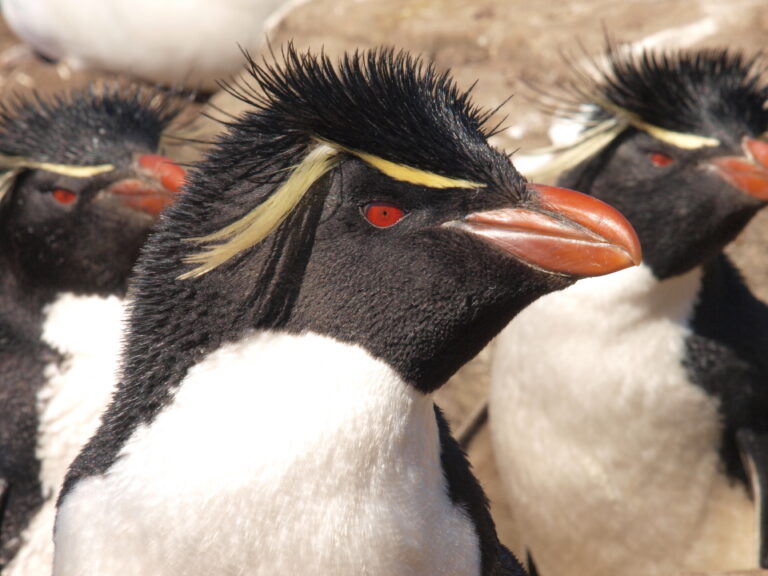Project Description
This PhD will investigate how environmental variability influences the foraging behaviour and demographics of the Southern Rockhopper Penguin (Eudyptes chrysocome) at multiple colonies within the Falkland Islands. This species has declined rapidly in recent times, with mass mortality events believed to be connected to changes in sea temperatures and food availability. Given environmental stochasticity is predicted to increase into the future under anthropogenic climate change, and the Falkland Islands represent a major stronghold for this species, this provides an opportunity to investigate how environmental variability influences behaviour and demography in this iconic predator.
Human-induced rapid environmental change presents multiple major threats to many organisms; and improving our understanding of organisms’ (in)ability to adapt to these changes is an increasingly central component of ecological and evolutionary research. For example, warming ocean conditions, overfishing, and increases in extreme weather events, together with their knock-on impacts on prey distributions and availability, represent major threats to seabird populations. As apex predators, these species are regularly deployed as indicators of the health of our marine environments, yet the relative importance of different environmental mechanisms as drivers of behavioural and population change can be highly variable among systems. Such bottom-up and top-down processes can also vary temporally and spatially, adding further complexity. However, improving our understanding of the relative importance and potential interactions between different environmental variables is essential for understanding species’ potential responses at the individual- and population-level. In turn this can inform broader marine spatial planning and achieve ecosystem-based management goals.
This multidisciplinary project will utilise new and archival data stretching back over 10 years from multiple colonies around the Falkland Islands to determine: 1) at-sea behaviour via biologging devices (e.g. GPS and time-depth tags) 2) foraging preferences using stable isotope, DNA metabarcoding and regurgitate analyses 3) demographic parameters (e.g. breeding success, population size) and timings, and will 4) combine these data through state of the art statistical modelling. Ultimately, this project will allow us to make important scientific and applied contributions through:
- Developing an understanding of the key anthropogenic influences driving demographic and behavioural changes in the marine environment.
- Informing Falkland Islands Marine Managed Areas and improving environmental impact assessments for current, and future, extractive industries through enhancing our understanding of past and current impacts on a charismatic predator.
You will be based at the University of Aberdeen, but the project is expected to involve extensive fieldwork in the Falkland Islands. Here you will be supported by the South Atlantic Environmental Research Institute (SAERI). You will learn a range of transferable skills that will make you highly competitive for a career in research, applied conservation or consultancy, including: analysis and synthesis of large datasets; remote monitoring technologies; animal handling; experimental design and fieldwork logistics; GIS and advanced statistical techniques; communication skills through traditional and emerging media to a wide variety of audiences.
We encourage applications from all backgrounds and communities, and are committed to having a diverse, inclusive team. Unsure about applying? Drop us an email.
CANDIDATE BACKGROUND
Essential:
- Capacity to conduct fieldwork independently in the field in remote locations
Desirable:
- Wildlife handling skills
- Full manual driving license (or the ability to achieve this within an appropriate timemframe)
- Some familiarity with statistical and spatial analyses in coding environments (e.g. R, Python software)
Photo credit: Thomas Bodey, UOA
Supervisors
Thomas BodeyPrimary Supervisor: | Profile: Thomas Bodey Email: thomas.bodey@abdn.ac.uk Institution: University of Aberdeen Department/School: School of Biological Sciences |
Paul CaplatSecondary Supervisor: | Profile: Paul Caplat Email: p.caplat@qub.ac.uk Institution: Queen's University, Belfast Department/School: School of Biological Sciences |
Beth ScottAdditional Supervisor: | Profile: Beth Scott Email: b.e.scott@abdn.ac.uk Institution: University of Aberdeen Department/School: School of Biological Sciences |
Additional Supervisor: | Dr Alastair Baylis, South Atlantic Environmental Research Institute Email: ABaylis@saeri.ac.fk |
References
Baylis et al 2021 Ecol Appl Overlap between marine predators and proposed Marine Managed Areas on the Patagonian Shelf https://doi.org/10.1002/eap.2426
Bernard et al 2021 Cons Letts Toward a global strategy for seabird tracking 10.1111/conl.12804
Orgeret et al 2021 Ecol Letts Climate change impacts on seabirds and marine mammals: The importance of study duration, thermal tolerance and generation time 10.1111/ele.13920
QUADRAT Themes
- biodiversity
- environmental-management
Partners
CASE Partnership with South Atlantic Environmental Research Institute
A CASE Partnership project is delivered in collaboration with an industry partner. The CASE partner organisation contributes finance, expertise, facilities and an internship.






















































